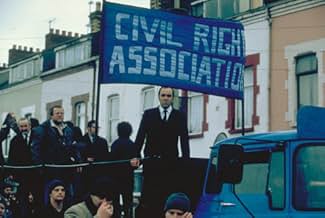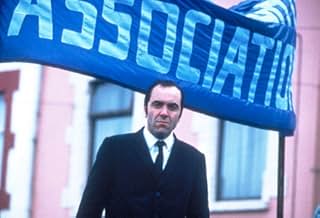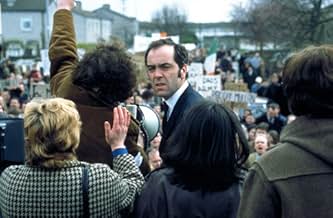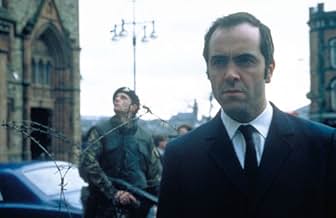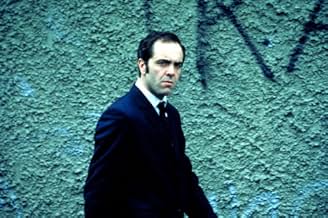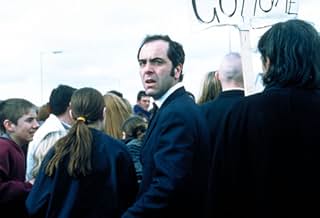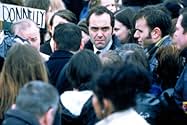A dramatization of the Irish civil rights protest march and subsequent massacre by British troops on January 30, 1972.A dramatization of the Irish civil rights protest march and subsequent massacre by British troops on January 30, 1972.A dramatization of the Irish civil rights protest march and subsequent massacre by British troops on January 30, 1972.
- Won 1 BAFTA Award
- 19 wins & 23 nominations total
Carmel McCallion
- Bridget Bond
- (as Carmel Mccallion)
Christopher Villiers
- Maj. Steele
- (as Chris Villiers)
- Director
- Writer
- All cast & crew
- Production, box office & more at IMDbPro
Featured reviews
Powerful, provocative & prompting, Bloody Sunday is a meticulously researched, expertly crafted & thoroughly gripping recreation of the Bogside massacre that occurred in the Northern Ireland town of Derry when British troops opened fire on civilians during a protest march, killing 14 & wounding just as many in the process.
Dramatising the events that led to the tragic incident on January 30, 1972, Bloody Sunday follows a civil right activist named Ivan Cooper who was the central organiser of the peaceful rally against internment that ended when British army paratroopers began firing on the unarmed demonstrators in full view of the public & the press.
Written & directed by Paul Greengrass, the movie sets its foreboding tone right within the opening segment after which it takes a step back to put its pieces on the board but once the stage is set, it explodes & moves forward with stunning immediacy. Greengrass' direction is at its very best when things go south & the whole episode is extensively detailed in the script.
Cinematography employs the quasi-documentary-style to film the entire event as it unfolds, thus bringing the viewers right into the conflict, while the frenetic hand-held camera-work further reflects the chaotic nature of such circumstances. Editing is slick for the most part, music is nearly absent and its cast contributes with convincing performances, playing their given roles with utmost sincerity.
On an overall scale, Bloody Sunday is a fiercely directed, deftly scripted, viciously photographed, skilfully edited & brilliantly performed movie that brings the dreadful event to life with remarkable precision, brims with intense emotions from start to finish, and not only works as a riveting thriller but also as an unsettling documentary. Disturbing & disquieting but essential viewing nonetheless, Bloody Sunday is strongly recommended.
Dramatising the events that led to the tragic incident on January 30, 1972, Bloody Sunday follows a civil right activist named Ivan Cooper who was the central organiser of the peaceful rally against internment that ended when British army paratroopers began firing on the unarmed demonstrators in full view of the public & the press.
Written & directed by Paul Greengrass, the movie sets its foreboding tone right within the opening segment after which it takes a step back to put its pieces on the board but once the stage is set, it explodes & moves forward with stunning immediacy. Greengrass' direction is at its very best when things go south & the whole episode is extensively detailed in the script.
Cinematography employs the quasi-documentary-style to film the entire event as it unfolds, thus bringing the viewers right into the conflict, while the frenetic hand-held camera-work further reflects the chaotic nature of such circumstances. Editing is slick for the most part, music is nearly absent and its cast contributes with convincing performances, playing their given roles with utmost sincerity.
On an overall scale, Bloody Sunday is a fiercely directed, deftly scripted, viciously photographed, skilfully edited & brilliantly performed movie that brings the dreadful event to life with remarkable precision, brims with intense emotions from start to finish, and not only works as a riveting thriller but also as an unsettling documentary. Disturbing & disquieting but essential viewing nonetheless, Bloody Sunday is strongly recommended.
"Bloody Sunday" is a very startling, cinema-verite recreation of a very specific date (January 30, 1972), in a very specific place (Derry, Northern Ireland) of an event that for the Irish became "our Sharpeville."
But for an American audience with no benefit of subtitles for the brogues and working class Brit accents, no explanations outside of eventual context for lingo and slang (it took me awhile to keep track of "provos" vs "paras"), the quasi-documentary, in-your-face approach takes on a tragic universality.
It could be part of a Cassandra trilogy with `Black Hawk Down' and `No Man's Land' about why military should not be in charge in urban strife, whether as "peacekeepers" or in civil wars or regime changes, no matter how heinous the regime to be changed. A lesson for the Baghdad invasion planners?
Cities are complicated social ecologies, and the film shows a great diversity of attitudes and pressures on all sides, managing to be both clinical in meticulous detail and visceral in shocking impact. The film is probably not objective about the British (I don't think it's a coincidence that the imperious Brit "observer" who takes repugnant charge is played by Tim Pigott-Smith who was a similar colonialist in `The Jewel in the Crown.") A central universal image becomes the awesome power of rock-throwing, unemployed teen-age boys to spark war.
The liberals in the middle, clinging to dreams of Gandhi, Martin Luther King, and fair community relations, are morally destroyed over the course of a few hours and the extremists with guns on both sides feed on each other in perpetual destruction like the ouroboros image of the snake eating itself. I kept feeling I missed the exact flash point in a wandering attention moment and wanted to immediately re-watch it to see if I could track the gotcha! moment when escalation could have been prevented, so I look forward to this being available on video tape.
But the film does clearly show that it was attitudes that created the violent outcome and consequent government non-investigation, as we see in so many police situations. Once soldiers enter a city it is a police situation with all those complexities.
I know James Nesbitt primarily from frothy Irish comedies, like `BallykissAngel,' so his staggering portrayal of the M.P. in the middle is a revelation, as he goes from planning a civil rights march to pleading with his girlfriend to physical heroism to a break-down in shock.
The version of the titular U2 song played out at the end, running well past the credits finish, is a moving, live, passionate audience sing-along where Bono shouts out other locales that have experienced similar situations to emphasize the universality.
But for an American audience with no benefit of subtitles for the brogues and working class Brit accents, no explanations outside of eventual context for lingo and slang (it took me awhile to keep track of "provos" vs "paras"), the quasi-documentary, in-your-face approach takes on a tragic universality.
It could be part of a Cassandra trilogy with `Black Hawk Down' and `No Man's Land' about why military should not be in charge in urban strife, whether as "peacekeepers" or in civil wars or regime changes, no matter how heinous the regime to be changed. A lesson for the Baghdad invasion planners?
Cities are complicated social ecologies, and the film shows a great diversity of attitudes and pressures on all sides, managing to be both clinical in meticulous detail and visceral in shocking impact. The film is probably not objective about the British (I don't think it's a coincidence that the imperious Brit "observer" who takes repugnant charge is played by Tim Pigott-Smith who was a similar colonialist in `The Jewel in the Crown.") A central universal image becomes the awesome power of rock-throwing, unemployed teen-age boys to spark war.
The liberals in the middle, clinging to dreams of Gandhi, Martin Luther King, and fair community relations, are morally destroyed over the course of a few hours and the extremists with guns on both sides feed on each other in perpetual destruction like the ouroboros image of the snake eating itself. I kept feeling I missed the exact flash point in a wandering attention moment and wanted to immediately re-watch it to see if I could track the gotcha! moment when escalation could have been prevented, so I look forward to this being available on video tape.
But the film does clearly show that it was attitudes that created the violent outcome and consequent government non-investigation, as we see in so many police situations. Once soldiers enter a city it is a police situation with all those complexities.
I know James Nesbitt primarily from frothy Irish comedies, like `BallykissAngel,' so his staggering portrayal of the M.P. in the middle is a revelation, as he goes from planning a civil rights march to pleading with his girlfriend to physical heroism to a break-down in shock.
The version of the titular U2 song played out at the end, running well past the credits finish, is a moving, live, passionate audience sing-along where Bono shouts out other locales that have experienced similar situations to emphasize the universality.
This is a film with a terrible nerve, from the press conferences in the Sunday morning, through the preparations for the march and the preparations of the military, and forward to the scenes in the hospital afterwards. The camera is working in a way, there you definitely can feel the gloomy weather and the excitement.
It's also a 1972 feeling about it, which doesn't feel acted, but like a documentary. James Nesbitt is making a tremendous job as the MP and when you notice that this man hasn't got an Oscar, the Oscar institution definitely seems like the stupid joke it is.
The only thing you can have against this Paul Greengrass' movie is the tendency in the end, where the relative documentary objectivity in the beginning, moves over to tendency. The unionists and the British government remain the totally bad guys and the catholics are the eternal martyrs. They might have been that this Sunday, but the conflict of Northern Ireland is a little more complicated.
However, this is definitely more exciting than most of what you see in the action genre.
It's also a 1972 feeling about it, which doesn't feel acted, but like a documentary. James Nesbitt is making a tremendous job as the MP and when you notice that this man hasn't got an Oscar, the Oscar institution definitely seems like the stupid joke it is.
The only thing you can have against this Paul Greengrass' movie is the tendency in the end, where the relative documentary objectivity in the beginning, moves over to tendency. The unionists and the British government remain the totally bad guys and the catholics are the eternal martyrs. They might have been that this Sunday, but the conflict of Northern Ireland is a little more complicated.
However, this is definitely more exciting than most of what you see in the action genre.
Obviously an important day in history, and the events of that day are breathtakingly conveyed by the best Docudrama filmmaker we have, Paul Greengrass, Before we Knew who he was-and that may have made a certain difference in my experience of the film-it was more exhilarating (and impressive) before Greengrass had made a name for himself at this kind of documentary-styled filmmaking. This one, when it came out, definitely gave me goosebumps....todd gold
Normally I don't enjoy the handheld documentary style films, as they tend to induce waves of nausea, but Bloody Sunday had me riveted from the word go. That we already know how it's going to end is irrelevant, the pressure building on the day of the march is almost unbearable. Though there's been criticism that the film is slanted towards the republican point of view, I found it balanced, even in the depiction of the soldiers and officers. Everybody certainly looked the part and I went away feeling some sympathy for both sides. Given the close quarters and inflammatory nature of the conflict, it's amazing that bloodbaths like this (soldiers blasting civilians) haven't happened more often in Northern Ireland. It's only now, that retired soldiers have broken ranks and talked about what actually happened, that a film like this can see the light of day.
Did you know
- TriviaTo make this movie as authentic as possible, no lights were used in the movie and the camera work was entirely hand-held
- GoofsThe marchers carry homemade cardboard signs with slogans written on them. When shown from behind, some have modern printing ("Made in China") on them that are not appropriate for 1972.
- Quotes
Ivan Cooper: I just want to say this to the British Government... You know what you've just done, don't you? You've destroyed the civil rights movement, and you've given the IRA the biggest victory it will ever have. All over this city tonight, young men... boys will be joining the IRA, and you will reap a whirlwind.
- Crazy creditsThe live rendition of U2's Sunday, Bloody Sunday continues to play for a full three minutes over a black screen after the credits finish rolling.
- ConnectionsFeatured in The 2003 IFP Independent Spirit Awards (2003)
Details
Box office
- Budget
- £2,000,000 (estimated)
- Gross US & Canada
- $773,228
- Opening weekend US & Canada
- $29,419
- Oct 6, 2002
- Gross worldwide
- $1,758,689
- Runtime
- 1h 51m(111 min)
- Color
- Sound mix
- Aspect ratio
- 1.85 : 1
Contribute to this page
Suggest an edit or add missing content

